|
|
|
Sort Order |
|
|
|
Items / Page
|
|
|
|
|
|
|
| Srl | Item |
| 1 |
ID:
153642
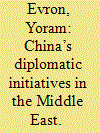

|
|
|
|
|
| Summary/Abstract |
Since the early 2010s, there have been mounting calls in China to intensify its role in the Middle East. But seeing the region as highly turbulent, Beijing seems to restrain its political involvement there. So what role does China actually strive for in the Middle East? To answer this question, the article first presents China’s discourse on its future role in the region; next, it analyzes China’s involvement in the Israeli–Palestinian conflict and the Syrian civil war, focusing on three diplomatic initiatives it has made concerning these issues. The argument here is that China strives to be part of major processes in the Middle East and attempts to advance its values and interests there, but in a unique pattern of big-power involvement in the region, it tries to achieve this without intensive investment of political, economic, and military resources.
|
|
|
|
|
|
|
|
|
|
|
|
|
|
|
|
| 2 |
ID:
153644
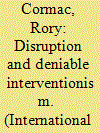

|
|
|
|
|
| Summary/Abstract |
The United Kingdom has long engaged in covert action. It continues to do so today. Owing to the secrecy involved, however, such activity has consistently been excluded from debates about Britain’s global role, foreign and security policy and military planning: an important lacuna given the controversy, risk, appeal and frequency of covert action. Examining when, how and why covert action is used, this article argues that contemporary covert action has emerged from, and is shaped by, a specific context. First, a gap exists between Britain’s perceived global responsibilities and its actual capabilities; policy elites see covert action as able to resolve, or at least conceal, this. Second, intelligence agencies can shape events proactively, especially at the tactical level, while flexible preventative operations are deemed well suited to the range of fluid threats currently faced. Third, existing Whitehall machinery makes covert action viable. However, current covert action is smaller scale and less provocative today than in the early Cold War; it revolves around ‘disruption’ operations. Despite being absent from the accompanying debates, this role was recognised in the 2015 Strategic Defence and Security Review, which placed intelligence actors at the heart of British thinking.
|
|
|
|
|
|
|
|
|
|
|
|
|
|
|
|
| 3 |
ID:
153641
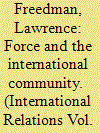

|
|
|
|
|
| Summary/Abstract |
Tony Blair’s April 1999 Chicago speech is widely seen as foreshadowing his later decision to support the invasion of Iraq. Two sets of context for the speech are described: other criteria for the use of force, going back to the Just War tradition and more recent contributions from Caspar Weinberger and Colin Powell, and the December 1998 strikes against Iraq and the Kosovo War, which began in March 1999. The origins of the five factors mentioned when considering force are explored and their implications assessed.
|
|
|
|
|
|
|
|
|
|
|
|
|
|
|
|
| 4 |
ID:
153645
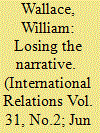

|
|
|
|
|
| Summary/Abstract |
The United Kingdom’s awkward relationship with the countries on the European continent reflects the ambiguity of its national identity, wavering between European engagement and the English-speaking peoples, as much as differences over economic interests. The founding narrative of West European integration, after the Second World War, has also weakened with generational change, the end of the Cold War and eastern enlargement. Developing persuasive new narratives both for the United Kingdom and the European Union (EU) are necessary but difficult tasks for continuing cooperation.
|
|
|
|
|
|
|
|
|
|
|
|
|
|
|
|
| 5 |
ID:
153643
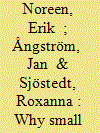

|
|
|
|
|
| Summary/Abstract |
The security behavior of small states has traditionally been explained by different takes of realism, liberalism, or constructivism – focusing on the behavior that aims toward safeguarding sovereignty or engaging in peace policies. The issue of why states with limited military capacities and little or no military alignments or engagements decide to participate in an international mission has received limited attention by previous research. In contrast, this article argues that a three-layered discursive model can make the choices of small states more precisely explained and thereby contribute to an increased understanding of small states’ security behavior beyond threat balancing and interdependence. Analyzing a deviant case of a non-aligned small state, this article explains why Sweden became increasingly involved in the North Atlantic Treaty Organization (NATO)-led International Security Assistance Force (ISAF) mission in Afghanistan. By focusing on the domestic political discourses regarding the Swedish involvement in this mission, it is suggested that a narrative shapes public perception of a particular policy and establishes interpretative dominance of how a particular event should be understood. This dominant domestic discourse makes a certain international behavior possible and even impossible to alter once established. In the Swedish case, it is demonstrated that this discourse assumed a ‘catch-all’ ambition, satisfying both domestic and international demands. In general terms, it should thus be emphasized that certain discourses and narratives are required in order to make it possible for a country to participate in a mission such as ISAF and prolong the mission for several years.
|
|
|
|
|
|
|
|
|
|
|
|
|
|
|
|
|
|
|
|
|